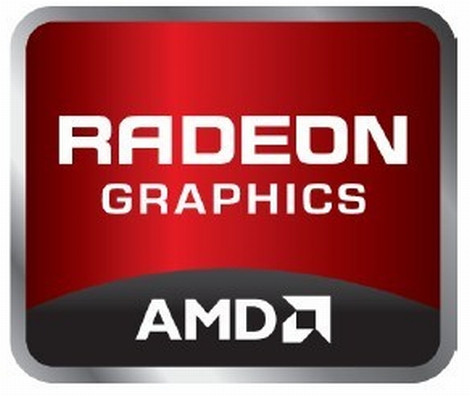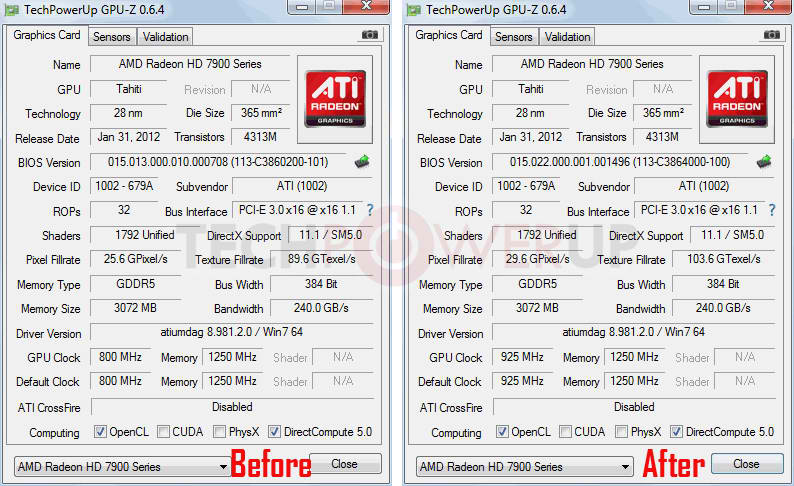AMD Updates Radeon HD 7950 to Counter GeForce GTX 660 Ti
Prior to release of the Nvidia GTX 660 Ti, AMD countered with a BIOS update for the Radeon HD 7950 to increase performance.
In preparation to the Nvidia GeForce GTX 660 Ti release, AMD prepared to update the specifications of its Radeon HD 7950 GPU to make it more competitive at its price point. This is a similar move that AMD made after the release of the Nvidia GeForce GTX 670 to make the Radeon HD 7970 more competitive with the release of the HD 7970 1GHz version. With the HD 7950, AMD is updating the HD 7950 similarly to how it handled the Radeon HD 7750: it received a core frequency increase through a specifications update.
AMD has released a new BIOS ROM image file, which works on all AMD reference design Radeon HD 7950 graphics cards that implements the new specifications. The specifications increase the core frequency to 850 MHz (from 800 MHz), and introduces PowerTune with Boost, which sends the clock speed up to 925 MHz (when applications demand it). The other specifications remained the same for the HD 7950, including the memory frequency, stream processor, TMU, and ROP counts. Any Radeon HD 7950 graphics cards manufactured from mid-August and thereafter will feature the new specifications, with no planned price change.
techPowerUp has provided a link to where you can download the updated BIOS, that only works for AMD reference designed Radeon HD 7950's. AMD Radeon HD 7950 Specifications Update BIOS
Contact Us for News Tips, Corrections and Feedback
Get Tom's Hardware's best news and in-depth reviews, straight to your inbox.
-
innocent bystander ReplySo basically this new bios update overclocks the card?
Or clocks it where it should have been from the get-go :)
IB -
tanjo Anyone buying these kinds of video cards would probably go with custom coolers which is usually factory overclocked. The price difference between custom and reference design cards is not that big. Buyers don't want to risk their cards with crappy reference coolers.Reply
Would non-reference cards with stock clocks follow suit? -
matt_b tanjoThe price difference between custom and reference design cards is not that big. Buyers don't want to risk their cards with crappy reference coolers.Buyers looking to water-cool WANT the reference boards so the type of cooler is irrelevant to them, savings are welcomed.Reply
This generation of Radeon cards have so much headroom to overclock anyway, so why not. The original clocks were conservative anyway. Not like it matters much, anyone can take your basic CCC and do it themselves. Besides, Nvidia and AMD are staggered quite a bit on their release cycles these days, in a short while, we'll be back at it with the GTX6xx vs the Radeon HD 8xxx price/performance war (hard to believe this card is already over 7 months old).
-
master_chen What I really lol at (and like it, at the same time), is that 925 MHz are basically the same frequency at which reference non-OCed HD 7970 works! Thus, you get HD 7970-performance, but for the price of HD 7950. I wouldn't really buy it for myself (because I have both Sapphire's HD 7970 AND MSi's "R7970 Lighting"), but for people who cannot afford HD 7970 or don't know anything about GPU OverCloking (or both at the same time), this is probably the best option so far. Seriously, if you want HD 7970 performance - get this, not the reference HD 7970. From now on, reference HD 7970 is absolutely useless.Reply -
bustapr this update just seems like an excuse for AMD not to drop prices. the card magically became better!Reply -
bustapr master_chen...reference HD 7970 is absolutely useless.Reply
Ill gladly take that useless reference 7970 off your hands -
Formata Nice one AMD! 6 months later, your customers can now use their GPU the way it could/should have been from the start. Or are you admitting you had the settings wrong at release of the product?Reply

